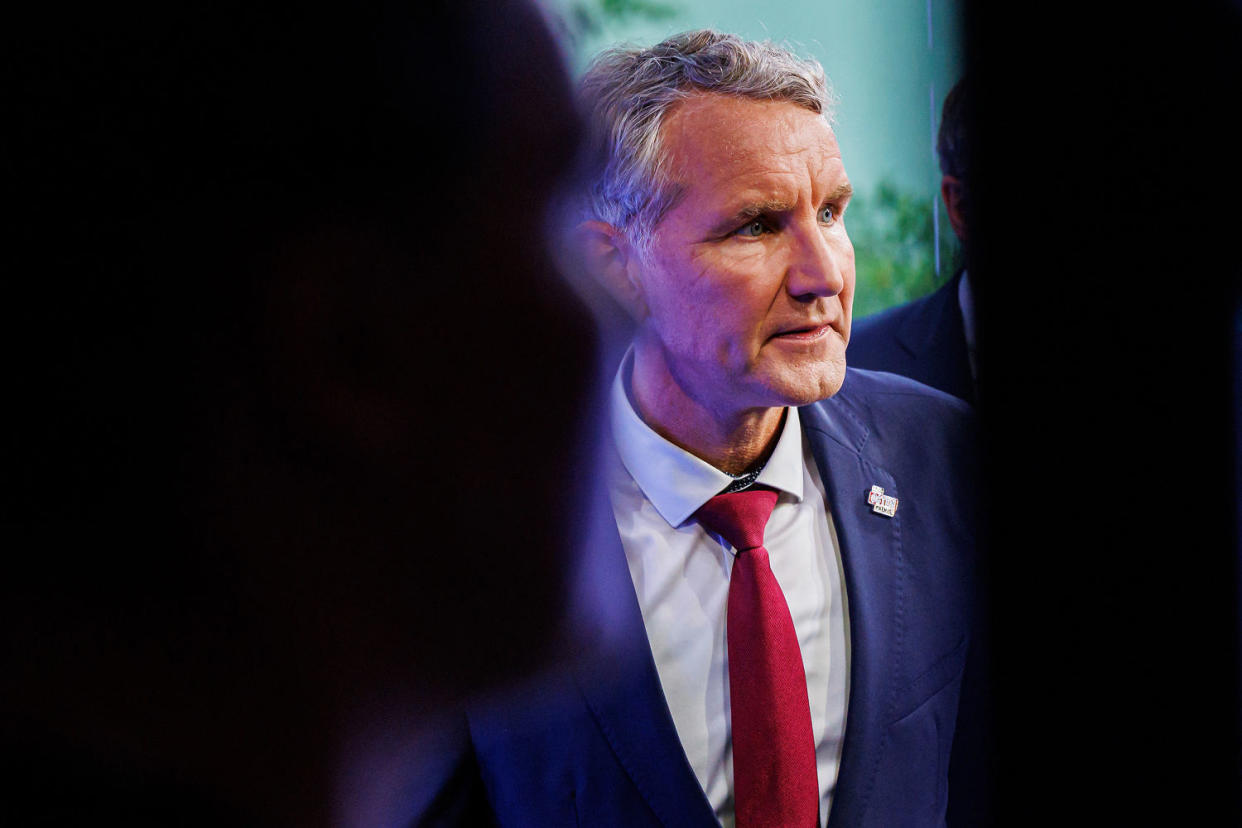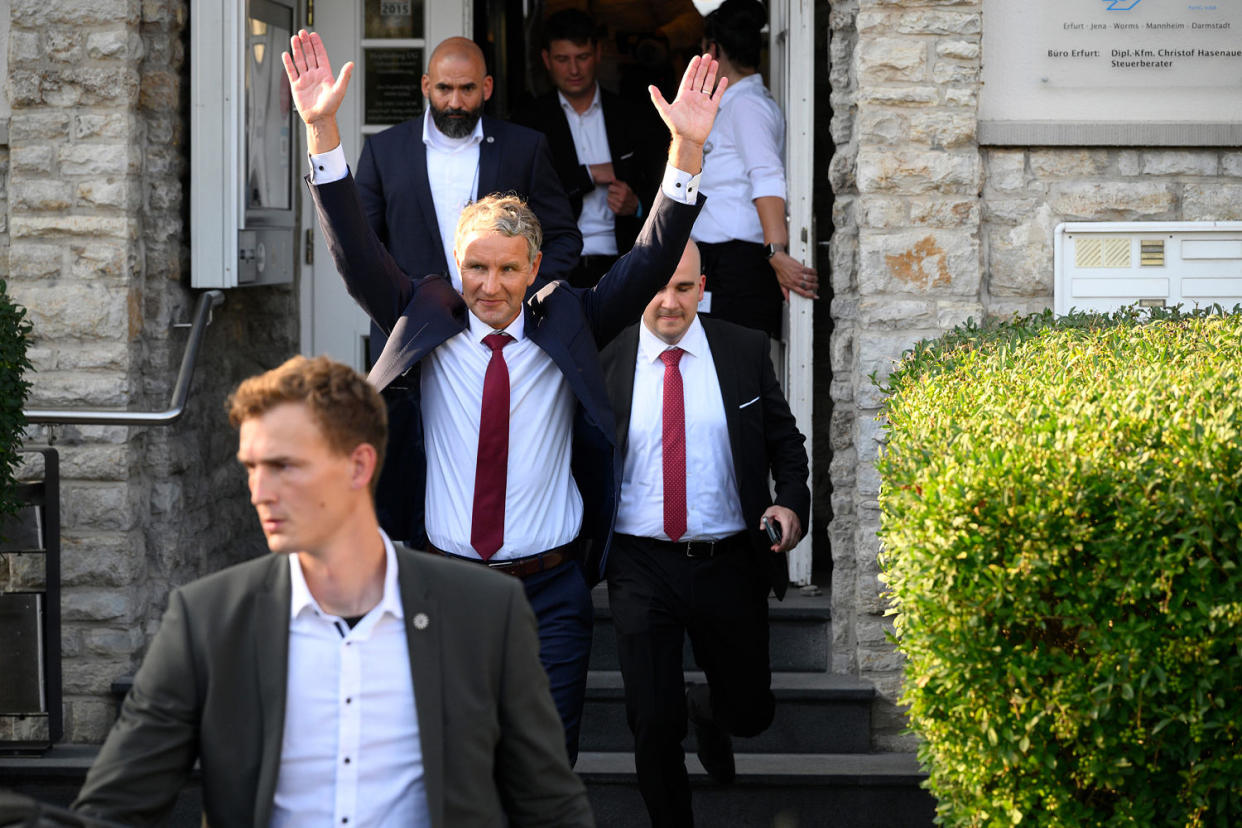With the far-right on the rise in east Germany, fears for what comes next
MUNICH — German Chancellor Olaf Scholz on Monday pleaded with mainstream parties to not change course and decide to enter a coalition with the first far-right party to come first in a state legislature election since the Nazis held power 80 years ago.
“Our country cannot and must not get used to this,” Scholz, a lawmaker for his center-left Social Democratic Party (SPD), said a day after Alternative for Germany (AfD) triumphed in Thuringia and came a close second in Saxony.
“The AfD is damaging Germany. It is weakening the economy, dividing society and ruining our country’s reputation,” he added.
The anti-immigrant and anti-Islam party is being monitored for extremism by the country’s domestic intelligence agency.
While mainstream parties have traditionally boycotted the AfD, meaning they will not form governing coalitions with the movement, its growing popularity is believed to have pulled other parties right. Meanwhile, traditional parties have lost ground in Germany, as in other parts of Europe, amid growing voter anger at mainstream politics.

After the AfD received 32.8% of Sunday’s vote in Thuringia, Björn Höcke, the party’s leader in the state, was jubilant as he celebrated with his colleagues and party members. “I think the mood is very clear. People want change,” said Höcke, who was fined twice this year by German courts for using the Nazi-era slogan “Everything for Germany” at two AfD events in recent years. He has appealed the rulings.
There were similar scenes in Saxony where the party came a close second behind the Christian Democratic Union (CDU) after securing 30% of the vote.
Ahead of the elections, the conservative CDU, which came second in Thuringia, said it would not work with the AfD.
AfD leaders indicated that they were hoping their strong showings would induce the CDU to join with them in governing coalitions, which are common in Germany.
“The voter has decided. He wants the AfD to participate in the government,” Alice Weidel, the AfD’s national party leader, said in an interview with Germany’s ZDF broadcaster.
Saxony and Thuringia lie at the heart of what was once communist East Germany, the half of the country that had strong ties to the then-Soviet Union.
The AfD’s success was also condemned by Josef Schuster, president of the Central Council of Jews in Germany.

“More and more people are voting for the AfD out of political conviction, a right-wing extremist ideology manifested through protest. A populist BSW still leaves a lot unknown, but what we know about this new party and its top personnel does not bode well,” he wrote in an op-ed in Bild Germany’s highest selling tabloid.The left-wing Bündnis Sahra Wagenknecht (BSW) or Sahra Wagenknecht Alliance, a new party around its leader Sahra Wagenknecht, also won seats but is unlikely to work with the AfD.
Founded in April 2013 as a movement against the euro currency, the AfD has shifted its focus to Islam and immigration. It has grown in popularity at both local and national levels ever since, particularly in the former East Germany, which has lagged economically behind the west of the country.
Polling ahead of Sunday’s vote showed there is more skepticism about NATO and Germany’s support for Ukraine in its war against Russia. Both played roles in the AfD's triumph, Sébastien Maillard, an associate fellow at the London-based think tank Chatham House, told NBC News on Monday.
Immigration was the main issue for voters as they headed to the polls, he added.
More than 1 million people benefited from then-Chancellor Angela Merkel’s decision to open Germany’s doors to asylum-seekers in 2015, making the country by far the largest European destination for refugees. But the issue of integration is a thorny one and the AfD harnessed hostility toward foreigners as it emerged from the fringes.
It became an even hotter topic after three people were killed and eight wounded in a knife attack in the city of Solingen last month, for which the Islamic State terrorist group claimed responsibility.
The suspect is a 26-year-old Syrian citizen, identified by the German federal prosecutor’s office as “Issa Al H,” who had applied for and failed to gain asylum in Germany. It later emerged that he could have been deported to Bulgaria where he was first registered as an asylum-seeker, but that authorities failed to do so, a fact that was seized upon by the AfD.
“That just gave help to that trend, but that was already there,” Maillard said. “It’s a worrying vote for Scholz and his coalition who really are weakened by these results.”
While Scholz’s SDP won small percentages of the votes in Thuringia, their federal coalition partners, the environmentalist Green Party and the pro-business Free Democrats, were not able to get the minimum 5% of the vote required for a seat in the state. Both the SDP and the Greens won a small percentage of the vote in Saxony.
At a national level, Maillard added that the three-party coalition was “almost crippled,” because it’s always contradicting itself, the chancellor is always being challenged by the vice chancellor, so it looks quite weak.”
This could have longer-term effects on both next September’s federal elections and at the European level, he said.






